
The Tortricidae are a family of moths, commonly known as tortrix moths or leafroller moths, in the order Lepidoptera. This large family has over 11,000 species described, and is the sole member of the superfamily Tortricoidea, although the genus Heliocosma is sometimes placed within this superfamily. Many of these are economically important pests. Olethreutidae is a junior synonym. The typical resting posture is with the wings folded back, producing a rather rounded profile.

The Tortricinae are the nominate subfamily of tortrix moths. Commonly referred to as leafrollers, as the larvae build shelters by folding or rolling leaves of the food plant, the tortricinae include several notable pests as well species used as biological control agents against invasive weeds.
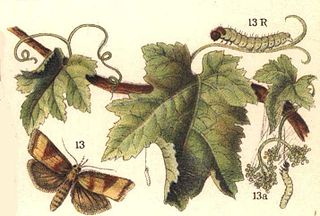
The Sparganothini are a tribe of tortrix moths.

The Archipini are a tribe of tortrix moths. Since many genera of these are not yet assigned to tribes, the genus list presented here is provisional.

Chlidanotinae is a subfamily of moths in the family Tortricidae.

The Cochylini are a tribe of tortrix moths. It used to be classified as the subfamily Cochylinae.

The flower hat jelly is a species of hydromedusa in the hydrozoan family Olindiidae. Although they look like a jellyfish, they actually belong in the class Hydrozoa, while true jellyfish belong in class Scyphozoa. Flower hat jellies occur in the northwestern Pacific off central and southern Japan, and South Korea's Jeju Island.. The adult form of the flower hat jelly only lives a few months and is typically seen from December to July, with peaks in April and May. During the day they rest on the bottom, often among rocks or algae, but at night they float up to hunt for their prey, typically small fish.

Eupoecilia ambiguella, the vine moth, is a moth of the family Tortricidae. It is found in Europe, China, India, Japan, Korea, Mongolia and the Russian Far East.

Polyorthini is a tribe of moths in the family Tortricidae.
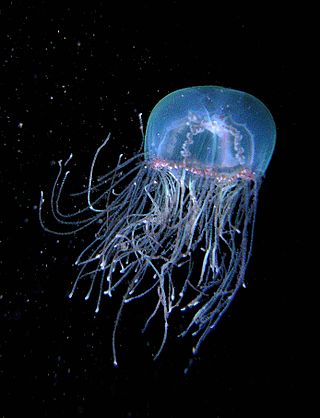
Olindias phosphorica, or cigar jellyfish, is a species of hydrozoan from the central and eastern Atlantic and the Mediterranean Sea. The Mediterranean sea is a predominantly warm body of water, thus O. phosphorica is a warm-water Jellyfish. Global warming has facilitated the proliferation of the species throughout the Mediterranean sea.
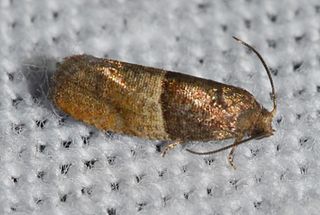
Larisa is a genus of moths belonging to the subfamily Olethreutinae of the family Tortricidae. It contains only one species, Larisa subsolana, which is found in North America, where it has been recorded from Alabama, Florida, Georgia, Illinois, Indiana, Kentucky, Maine, Maryland, Massachusetts, Minnesota, Mississippi, Missouri, New York, Ohio, Oklahoma, Ontario, Quebec, South Carolina, Tennessee, Texas, Virginia, and West Virginia.
Pseudogalleria is a genus of moths belonging to the subfamily Olethreutinae of the family Tortricidae.

Sereda is a genus of moths belonging to the subfamily Olethreutinae of the family Tortricidae.
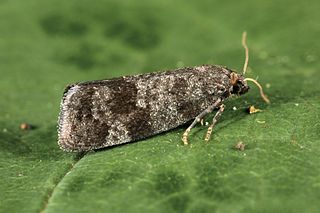
Neosphaleroptera is a genus of moths belonging to the subfamily Tortricinae of the family Tortricidae. It contains only one species, Neosphaleroptera nubilana, which is found in almost all of Europe and the Near East.

Gymnandrosoma is a genus of moths belonging to the family Tortricidae.

The Atteriini are a tribe of tortrix moths.

The Euliini are a tribe of tortrix moths.
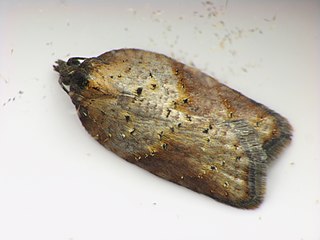
The Tortricini are a tribe of tortrix moths.

Olindia schumacherana, also known as the white-barred tortrix, is a moth of the family Tortricidae found in most of Europe. The moth was first described by the Danish zoologist, Johan Christian Fabricius in 1787.

Olindias is a genus of hydrozoans in the family Olindiidae.


















